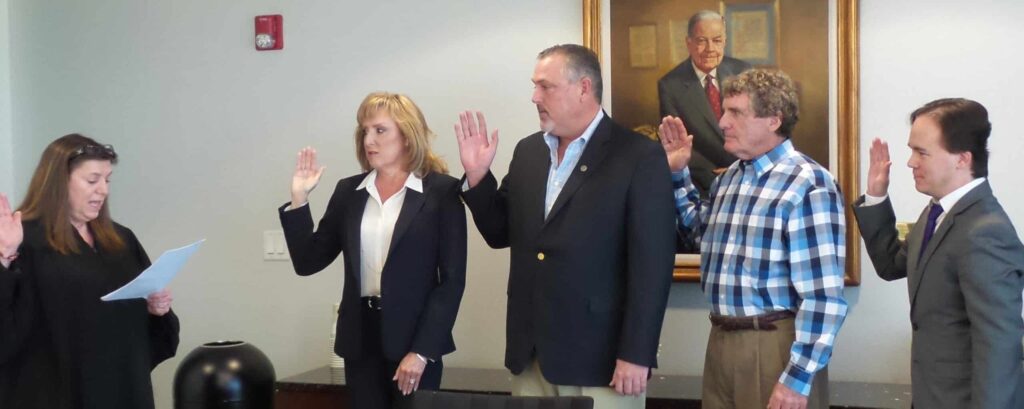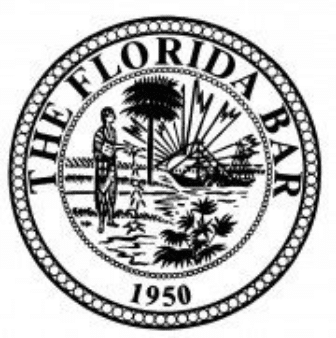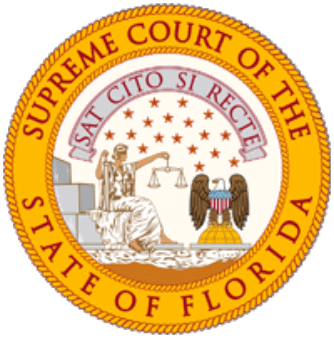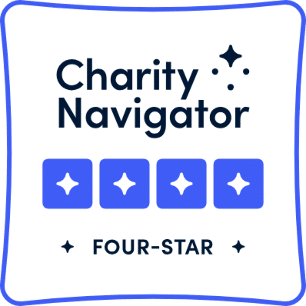
TAMPA, Fla. —The Florida Justice Technology Center, a new statewide nonprofit organization dedicated to increasing access to justice through the innovative use of technology, held its first board meeting Sept. 11 at the Tampa offices of Carlton Fields Jorden Burt.
Judge Catherine Peek McEwen of the U.S. Bankruptcy Court for the Middle District of Florida swore in as the center’s board chairman Tampa attorney Kathleen McLeroy, as well as the center’s other four founding board members.
“This center has gotten off the ground at lightning speed thanks to The Florida Bar Foundation, whose forward-thinking board recognized that technology will be key to expanding access to justice,” McLeroy said. “We will always need lawyers to help those with civil legal needs at all income levels, but like every other business process, the legal process can be made much more efficient and effective through the strategic application of technology.”
Following their swearing in, the board met for a day-long retreat to discuss the center’s mission and strategic priorities. The board defined the organization’s mission as “to facilitate broad access to civil justice by employing technology, coordinating stakeholders and focusing on self-sustaining programs and services.”
The board also reviewed and approved bylaws, operational policies and other administrative procedures and made plans to convene a stakeholder meeting before the end of the year to gather information about the current technology landscape in Florida. Its next board meetings are scheduled for October and November.
Funded through a $725,000 grant from The Florida Bar Foundation, the Florida Justice Technology Center will work not only with legal aid and pro bono programs but also with the judiciary and the court system, clerks of court, lawyers, law schools, corporations, community partners, and others to develop technology products and services that will expand access to justice. It will facilitate the development of streamlined, user-friendly systems to address the needs of those facing civil legal issues such as divorce, child custody, foreclosure, landlord-tenant disputes, home ownership, veterans’ benefits and elder affairs.
FJTC Executive Director Joyce Raby is tasked with building partnerships between the organization and all members of the Florida access to justice community. “It is such a great opportunity to serve the people of Florida,” Raby said. “We have so many people coming together to collaborate and coordinate around technology and how to use it to improve the legal system.”
The center’s board includes lawyers and business leaders with deep and wide-ranging experience related to legal services and technology. McLeroy is a member of the Florida Commission on Access to Civil Justice, co-chair of The Florida Bar’s Standing Committee on Pro Bono and an attorney with Carlton Fields Jorden Burt. FJTC Vice Chair Greg Coleman is immediate past president of The Florida Bar, a member of the Florida Commission on Access to Civil Justice, and a partner at the West Palm Beach Law Firm of Critton, Luttier & Coleman LLP. Serving as secretary/treasurer is Tom Oldt, a Florida Bar Foundation board member and founder of Thomas R. Oldt Investment Services LLC.
Also on the board are Adriana Linares, founder of LawTech Partners, a board member of the American Bar Association Law Practice Division Legal Technology Resource Center, and vice chair of the ELawyering Task Force; and James Haggard, staff attorney at Brevard County Legal Aid, an ad hoc member of the technology subcommittee of the Florida Commission on Access to Civil Justice, and founder of Wiedza Creations LLC, a legal tech start up.
###
The Florida Justice Technology Center is a statewide nonprofit organization whose mission is to facilitate broad access to civil justice by employing technology, coordinating stakeholders and focusing on self-sustaining programs and services. The center does not have a physical office but rather operates as a virtual office and in collaboration with other entities involved in legal and court technology in Florida.




